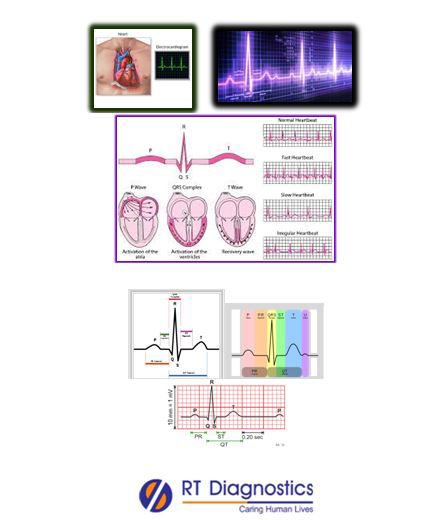Computerized ECG:
Why Computerized ECG Test?
CLINICAL INFORMATION
Electrocardiogram (ECG or EKG) records the electrical signals transmitted by the heart – i.e it gives a graphic display of the electrical activity of the heart. ECG machines are standard equipment in operating theaters, emergency wards in hospitals, ambulances with basic life support (nowadays some personal devices such as smartwatches too offer ECG monitoring), etc. It is a non-invasive and painless test performed (under the supervision of physicians or trained paramedics) in clinics that helps to detect heart problems quickly and to monitor prognosis in heart-related disorders. Electrodes (a small plastic patch that sticks to the skin) are placed at certain parts on the chest, arms, and legs (Einthoven Triangle), that are connected to an ECG machine by lead wires, and the resulting electrical activity of the heart is measured, interpreted and printed out. ECG is ordered as a part of the routine physical test or in cases with patients presenting with clinical manifestations such as chest pain, palpitations (noticeable heartbeats), murmurs, dizziness, shortness of breath, etc. A computerized ECG test helps to read ECGs by making frequent determinations of the direction, positive or negative, that the ECG is taking. Hence by taking this information, the computer calculates whether it is a ‘q’ wave or ST-segment elevation or depression, etc, thus delivering automated interpretations. Conditions that may interfere with ECG results are obesity, pregnancy, ascites, smoking, exercise, electrolyte imbalance, and certain medications, etc. ECG is a useful tool in identifying irregular heartbeats, conditions such as myocardial infarction, endocarditis (inflammation of the heart valves), monitor implanted pacemakers, monitor medications for heart diseases. Other related studies include echocardiograms etc.

General Instructions:
Sample Requirement: Specimen (not required) – Non-invasive test; Advice as directed by the physician. Test Preparation: None.
NOTE - Sample for specimen collections may vary based on the patient’s condition/cases according to the patient’s presenting complaints/signs or symptoms:
SPECIMEN REQUIREMENT (Special or Rare Cases) - As instructed and guided by Physician / Clinician / Pathologist / as per Laboratory’s requirements, according to procedures and protocols.
Sample Requirement: Specimen (not required) – Non-invasive test; Advice as directed by the physician.
Test Preparation: None
This Multi-Specialty Clinical Referral Laboratory RT DIAGNOSTICS provides precise and accurate tests with an extensive range of testing services to the medical centers to help in the diagnosis and identification of pathology in the test specimens for infectious diseases and also to evaluate the function of organ systems of the patient. It prevents further complications and helps to stabilize and restore health to near normalcy at the earliest without delay.



